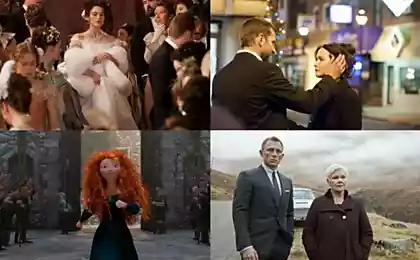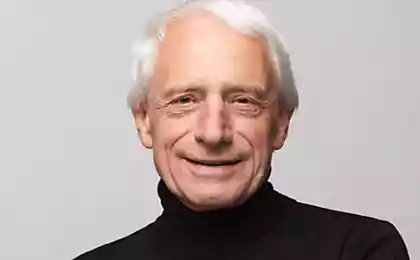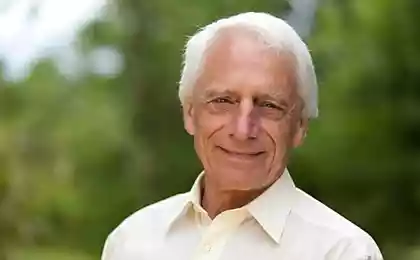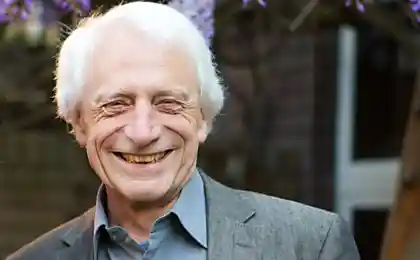867
Best lecture on the phenomenon of love by Professor Alfrid Langle

A magnificent, very simple and profound lecture by the German psychologist Alfrid Langle, which is worth listening to to understand a little more about love.
Love is a big subject. It's such a great subject that I have some sacred awe to talk about it. It's a topic we're all familiar with, but the experience we have is very different.
Most of us know the happiness that can be associated with love. But many of us also know the suffering that can be associated with love. And some may be familiar with the despair that can be associated with love. Despair, which can reach such an extent that you do not want to live.
The topic of love covers a lot. We know many areas in which love takes place – love for parents, children, partners, art, nature, animals. And maybe many of us have come here with this or that question, which is related to love. What question did I come here with today? Is there anything I want to know? .
I gained the courage to talk about love when I realized how difficult it is today to really learn anything about love. Where do we learn what love can be and how does love happen? How do we know about love?
Traditionally, religion gave an introduction to the theme of love. And today it seems that such an introduction gives the TV. And this situation, as it were, she throws a person at herself. That he must somehow discover for himself and find what love is. And what is it that matters in love?
There is also a great advantage in this, because because a person finds something himself, he sharpens his own individual perception and his own individual experience. But maybe we are paying too high a price for this advantage?
Perhaps these thoughts will help us to take a deeper look at this phenomenon of love and its significance in human life. I want to start with the box, the bed where love lies.
Love is a relationship.
I think everyone understands that. But this is not a relationship, but a special form of relationship. It is much more than just a relationship. Love is an encounter. So I want to start with a few descriptions of what a relationship is and what a meeting is.
Relationships have a connection.Relationships arise when I see another person. At this point, I'm behaving differently. I kind of take another person into consideration. At a very basic level, I have an attitude that I can’t just take myself out of. I relate my behavior, my life to another. If, for example, a person is sitting in a chair, I can’t just sit on a chair because they’re already sitting there. If a man is standing in the door, I will not walk through the door as if he were not there.
These are all basic forms of relationships. If there wasn't a man in the door, I'd walk through the door in a different way than if there was one.
There is a law here that we are not conscious of.I can't help but relate.If I see a person, I can't help but relate to him. Or something, not a person.
I take this object into account in my behavior. This is some basic form of relationship that we find ourselves in by nature. And I'm not free here. That’s how I build this relationship, how I live with it – that’s where freedom is. But what another man is and he exists is given. And when one person sees another person, he or she should enter into a relationship.
But relationships have another characteristic. Not only their inevitability, but going beyond that, they have a duration that never ceases. If I’m dating someone, I have a relationship history. Whenever I meet him again, I have met him once. And the history of our relations leaves an imprint on our future relations, on the form of relations. If, for example, I went to school with someone, it will affect all our relationships. And even if we get married later, the history of this relationship will still be present in this marriage.
This is the essence of the relationship we are aware of especially if we work, for example, with a patient and then we begin to develop some kind of private relationship. It's a very complicated and difficult relationship. And as psychologists, we have to be very careful to stay ethically correct. Because some wounds and other serious consequences can happen very quickly here. Because these therapist-client relationships remain, even when we enter into a different relationship.
The relationship has the characteristic thatRelationship history becomes an integral part of relationshipsIt's stored inside them. Everything that has happened between us is preserved. Every resentment, every joy, every disappointment, every sexuality, everything is preserved in the history of relationships. And leaves an imprint on our common existence. Therefore, it is very important to approach the relationship responsibly. Because we can't make something not happen. What once happened will remain.
These things – time and intimacy – provide some nourishment for a relationship. The first point I mentioned is that people enter into relationships simply by their presence in space. Something else about this item. In addition to what happens automatically, there is a free space. I can either enter into this relationship or abstain from it.
I can get into this relationship if I want to. Then I talk to that person, I talk about myself, and so on. But if I don't want to have a relationship, then I try not to have one. And closing. However, in the basic plane there is a relationship. But it's a relationship that we don't nurture, we don't cultivate.
To nurture a relationship, we need time, time for each other. This time allows relationships to grow. Growing a relationship is all about time and intimacy. When we are in love, we want to spend time with each other. When we don’t have time, love dies.
Time for loveThe same as the sun and water for plants. Same with intimacy. Intimacy also fuels relationships. Whoever wants to build a relationship is looking for intimacy with another.
I'm often asked... What to do about separation – does it promote or hinder love? I found the best answer in the proverb, “Separation and separation act on love like the wind.” Like wind on fire. If the fire is small, the wind will blow it. If it's big, the wind will blow it. Isn't that a beautiful analogy? It fits my experience.
So, relationships are some basis.
A meeting is an event that can be described as a point event on the timeline. Because meetings always happen within a relationship. Only where I have contact. But the meeting has a different character than the relationship. The meeting is spot-on. It's about the moment. When I meet you, I see you as a person.
I wonder what you care about, what you care about. I say what I care about. There is some exchange of what is personally important. It's a meeting. Then we say goodbye and this meeting ends. The meeting is marked by openness and dialogue. Relationships persist. But relationships change with each meeting. Meetings affect the nature of relationships.
Good relationships grow out of meetings.If we meet each other on the plane of Me and You, if we look into the eyes - it all nourishes the relationship. If there are few or no meetings in a relationship, then the relationship is weakened. If it is a strong relationship, then even with a small number of meetings, the relationship persists.
People can be separated for years (war or other events) and suddenly they meet again. They immediately know in another what they mean to another person. You may have had such an experience that you meet a friend many years later. And you may not recognize him right away... but as soon as you start talking, you immediately know... and say, “Look, you’re just like you used to be.”
Relationships can persist. But they are not updated without a moment of meeting. Well, I've told you something about some of the foundations of love, which is a relationship. And through renewal and through deepening of relations through meeting. Now I want to say a few words about what we mean by personal love. But I want to build on our experience.
What is characteristic of love that goes beyond just relationship and meeting? What do we feel when we love?
The first point is clear: we experience value.We are worried that we like this person. We feel that this person means something to us, that our heart is attached to this person. That our heart is attached to this man. We feel connected to this person, that we kind of belong to each other.
This applies not only to love for another person, but in general to love - and to love for music, art, psychology. We feel that we like it, we are interested, we are attracted to it.
So some specificity of love is some positive emotion. Or expressed in the form of some activity, this feeling.
What does feeling mean? What I do when I feel something. And what happens to me when I feel. For example, when I listen to music and I realize that that music wants to tell me what it means to me. In feeling, I am open and let something act on me. I give it something to do with me. I let the music come into me. And to impress my harmony, my beauty in me. And I take that sound from musical harmony into my heart.
To feel is to put my inner life at my disposal. That I let something come to my heart. So in feeling, my life starts to move, something moves in me. Feelings move me inside. Feelings awaken my life in me.
Love should be a feeling. Love must be at this level, otherwise it is not love. Only if something touches my life basis, my vitality, if I can worry that it awakens life in me, that I am awakening to life, then it is love.
In love, I feel as if another person touches me, as if he touches my heart and strokes it. It's not sentimental at all. It’s a deep acceptance of your own life. My life, which is because of this music, this picture, this animal, and naturally, first of all, because of another person, it all touches me so much that my heart starts to jump.
Love is therefore an experience of value. It’s different, it’s music, and I feel it as something of value. The experience of value is connected with this emotionality. Only the value that can be felt is existentially relevant.
The second point that describes our experiences is this moment of touching the value of the other person to me, which is experiencing resonance.A feeling of deep concern for me. This feeling does not arise out of some pressure that my needs put on me, but it arises out of resonance, such awe.
This being is the deepest in me, the innermost, it begins to vibrate because it corresponds to the vibration of the other. Because I am addressed by a certain You. You touch me. You're interesting to me. This is a kind of kinship between my self and your self, it resonates.
Because somewhere deep down, we're related. We don’t know how, but we are beginning to love. Maybe sometimes you can hear, or we said so ourselves, if we meet someone or love someone, it feels like I have always known this person. Because in fact, a person is much closer to that person somewhere in the depths, and feels related to that person.
This experience of resonance with another person is a deep phenomenological vision of the other person’s essence. Through my being I see your being. Carl Jasper once said, “A woman becomes more beautiful with age, but only the lover sees it.”
Scheller saw in love the highest form of human phenomenological possibility. He said that we see in the other its highest possible value. Not only that he is, but that he may be, that he is still asleep. That sleeping beauty sleeping. We see what can become of him.
In love we see man in his potentiality. Goethe had a similar vision. He says that love makes us see to another, not only in what he is, but in what he might be.
So it is very important that we love our children, it gives them the opportunity to grow to their potential. We see that this child might be able to play an instrument, and the other one is happy when he solves a mathematical problem. We see that the kids are asleep. And if we love them, we want to foster and awaken those potentials.
Lover, he has the feeling that through this experience of resonance we belong to each other, and if I am with you, then I think that you feel good that I am doing you good. That my closeness to you is beneficial to your potential. And it feels the opposite - your closeness to me, your presence makes me good and has a beneficial effect on my potential. I can be more myself and you can be yourself too.
The most beautiful generalization of this point was made by Dostoevsky: “To love is to see a person as God intended him to be.” It means, phenomenologically, as it could potentially be, with all the potentialities that lie dormant in it. What else are we going through?
So we experience value and resonance. And we're also experiencing the third point. That's a position.
Two positions, two special ways of relationship are in love. Based on the experience of value and resonance, a position arises in me, a decision that it is good that you are.
The lover experiences deep joy in being you. That's what it is. Maybe not everything is perfect, but the lover accepts it with its flaws. And from this position of “good that you are”, the lover wants to support the other person in his life, in his being.
We want to do everything for another to be good in his life, in his being.
And on this basis, there is another position, another form of relationship – the lover is active in this support of the other. The lover wants the other good. He wants to protect the other from suffering. He doesn’t want anything evil to happen to others. But he wants to grow and improve his quality of life. He wants to make an active contribution to this.
Augustine said, “I love and therefore I want you to be.” I call this the central thought of love in general. It makes love generative, productive. Love becomes the basis for a common future.
So what we experience in love is that we experience the value of the other person, we experience resonance, we experience an impulse to make the other person feel good, and the loving person, simply speaking, wants to make the other person feel good. Love contains the moment of decision. It's also a solution. We can do more together than if we're alone.
The next point is that love wants reality.
She wants to live in the ground, in reality. Love drives us to live it, to fulfill it.
What do we do when we love? We, for example, give flowers, gifts, maybe prepare something for each other. These are the forms in which love materializes. A person wants to live for another person. At least in some part of it.
And in partner love, love desires sexuality (except love for children, of course).
Love does not want to remain only in dreams, fantasies. At least if sexuality is impossible, then at least write a poem: Love wants truth. She wants to be true. Love cannot tolerate lies, untruths. When we love, we trust the other person more easily.
The last point is that love wants the future. Duration, preservation.
She doesn't want tomorrow to end what we were going through today. Because I'm good with you, I want it to continue.
Love wants to be productive and bear fruit. That we do something together, let something arise. Of course, love wants to have children. Which we have together and receive as a sign of love. A Swiss psychiatrist cited love in relation to caring: "Love is about doing something for someone else, taking care of them, taking something into the future.
Now I want to ask you about the psychological background of love. Why do we love?
Do we love because we find something like us in another? According to the thesis “like reaches for like,” or do we love, on the contrary, because we are different, according to the thesis “opposites attract”?
As far as I know, psychology has not yet solved this dilemma. For both of these cases have value. Something like this is familiar to us, we can somehow build on it. It helps me to accept it and myself better. It strengthens and strengthens me inside. There is an autoerotic component or some narcissistic component to love.
And in love for the opposite, for the excellent, we experience some fulfillment. Impulse, from being different, some growth.
There is an interesting wording in Christianity about this. The commandment of love for one’s neighbor, which we all know as the commandment “Love your neighbor as yourself.” If we take this phrase in the original, it means: “Love your neighbor, for he is just like you.”
The other is on one side of the other, and on the other, it is the same.
What seems to us to others, in its core, in its depths, it is just like me. Love for your neighbor is openness. It requires openness to itself. Something I didn't take. If I accept myself, I can accept you, the other. There is much less difference between a man and a woman than we think at first sight.
It is often said in psychotherapy that you must first love yourself before you learn to love others.
Is that so? Yes and no. So here's both again. Yes, in the sense that I need to relate to myself, and through this access to myself, it opens up access to the other. How I feel about myself, so in perspective to others.
But there is and there is not. My love for myself begins with the love of others for me. Other people, like my parents who love me, make me love myself.
Our love for ourselves is revealed only when others have loved us. Through the love of others, I can find a way to love myself. If my parents love me, then I will learn that I am a creature worthy of love. And then the question is, can I love myself? And over time, I learn.
And because my parents love me no matter what, even if I sometimes misbehave, I'm not always perfect, but it makes me realize that there's something so precious about me that I'm worthy of love. This leads me to love myself.
And because of this self-love, through this feeling that there is something in me, in my depths, that is worthy of love, I get some sensitivity towards the other. It opens my eyes that I can see what we can love in another.
The other one has a desire to outlive me completely. If I'm willing to accept this invitation and I kind of agree to it, then I really do. And then love really becomes a passion.
And it makes me ready to suffer. Hasidic wisdom says that the lover feels that the other hurts. Because we love, we feel that another is hurt.
Thus, love makes a person willing to accept suffering. For example, for children, for loved ones. Because because I love, I can't just leave you in trouble, I want to do you good, even if it costs me dearly.
Love generates suffering, very diverse suffering. It causes anguish that can burn our hearts. Out of failure, out of limitation, we can hurt each other. Not even wanting to.
If I suffer, the lover suffers with me. Suffering in love is always shared suffering. I can't feel good if it's bad for my loved one.
Sometimes we can suffer from the fire of love, from this burning, longing for unity, longing for the desire to merge, which can never be fully fulfilled.
We worry that we are ultimately separated even though we are together.
We suffer from the fact that there is some inequality between us. For all the resonance, sympathy, the other is not me, not identical with me. He can never match me in everything and completely, he's not me.
He often feels, thinks and feels differently. And even in my most intimate love, I'm a little alone.
And it can sometimes cause such restraint in a relationship. That a person can not give up completely in a relationship. Because the other one isn't perfect. . The man is waiting, maybe he will find something better. Well, if he doesn't, then we'll stay together. But they're secretly waiting, because there's still a feeling there -- well, we're not exactly perfect for each other. A few words about falling in love
Falling in love is the remnant of paradise on earth. There's no problem in the love phase. Man is in heaven and in his hands all the powers of the world. He doesn't need sleep or food.
Love, we have said before, is the seer, it sees the being of another. And they say falling in love is blinding. Why?
In love, I see a person as I want to see him. I still know so little of the other, and I fill all the gaps in the knowledge of the other with my desires.
So I'm actually in love with my own idea. And that is what makes love such a paradise experience. Because in my view there are no shadow sides.
In love, therefore, it is primarily about him, my fantasies, and my idealizations. We see in others his charm, attractiveness, eroticism. And all these are some cogs on which I can hang my performances. It bewitches me in another. Even the objects he touches fascinate me, which can lead to fetishism.
In conclusion, I want to talk about the sexuality of love, about the relationship of these two concepts.
Homosexuality can be just as personal as heterosexuality.
Love and sexuality are not only aimed at procreation, but they are some expression of community and communication, which is fundamentally open to the emergence of a third. But that third doesn't have to be a child. It can be a task, an art, a common celebration of life.
Sexuality means that the physical is combined with the mental. In sexuality we have the joy of experiencing the vital force through the corporeal sensuous plane. Because of this, what we experience from another becomes whole.
But sexuality has another face. As Merlo Panty describes. Namely, the person that in sexuality I can be an object for another.
This means that sexuality is possible without people loving each other. To receive this joy of life from another or with another, and this too can mean a moment of happiness. But it is certainly not the highest form of happiness if there is no level of personal relationship.
Why does infidelity hurt?
In infidelity, we worry that we are being replaced. For example, they are replaced at the level of sexuality. It is not me that matters to the other, but only my function. It makes me an object. And what I want, what I aspire to, what I desire, that I want to be “I am with you,” and become more of I, more of myself because of you, it crumbles. Therefore, betrayal takes time to build trust again.
What's important about love? What can I take with me?
Love demands integrity from us. That we see each other as we are, and in partner love we can bring it to the soil of sexuality. That I can experience another as he is with all my feelings. This is the most intense intimacy possible.
Love is an attitude, an encounter, an experience of the value of another that appeals to me in my being, that brings me into resonance with me. Love is therefore intimate, belongs only to the two of us, it is not public, its place is under the veil of shame.
And yet, we want it to be possible in this world. And that it must somehow manifest itself in the public, live together.
That’s why it’s so important that we have a sense of that subtlety and value that is associated with love.
Everything in the relationship persists. Even when we break up, everything we’ve gone through together remains in the relationship. Therefore, the relationship cannot simply be terminated. And if the one who is left behind continues to love, he can keep that love on this plane. In the position that I have the feeling that I'm doing you good with my love. But you probably have a feeling that my love isn't doing you well. We don't know which one of us is right. Maybe I'm wrong, maybe you're wrong.
But if you think that you are happier with another or with another (and there is an opportunity here that may not be available to everyone), then I want in a sense, in the last act of love, to give you freedom, as an expression of my love for you, to leave you in your new relationship, so that you can try, experience what is good for you. Maybe you're lucky, maybe you're not, but that's the last thing I can do for you.
And what I can live in, what my love can live in, even though you have already left you - that I leave you because I love you, and it means that I want you well with all my heart, even when it hurts me.
Alfrid Langle. Love: An Attempt at Existential Analysis
Summary of the lecture delivered at the Faculty of Psychology of MSU
P.S. And remember, just by changing your consciousness – together we change the world!
Join us on Facebook and VKontakte, and we are in Odnoklasniki
Source: planetaseminarov.ru/article/luchshaya-lektsiya-o-fenomene-lyubvi-lektsiya-professora-a-lingle/























